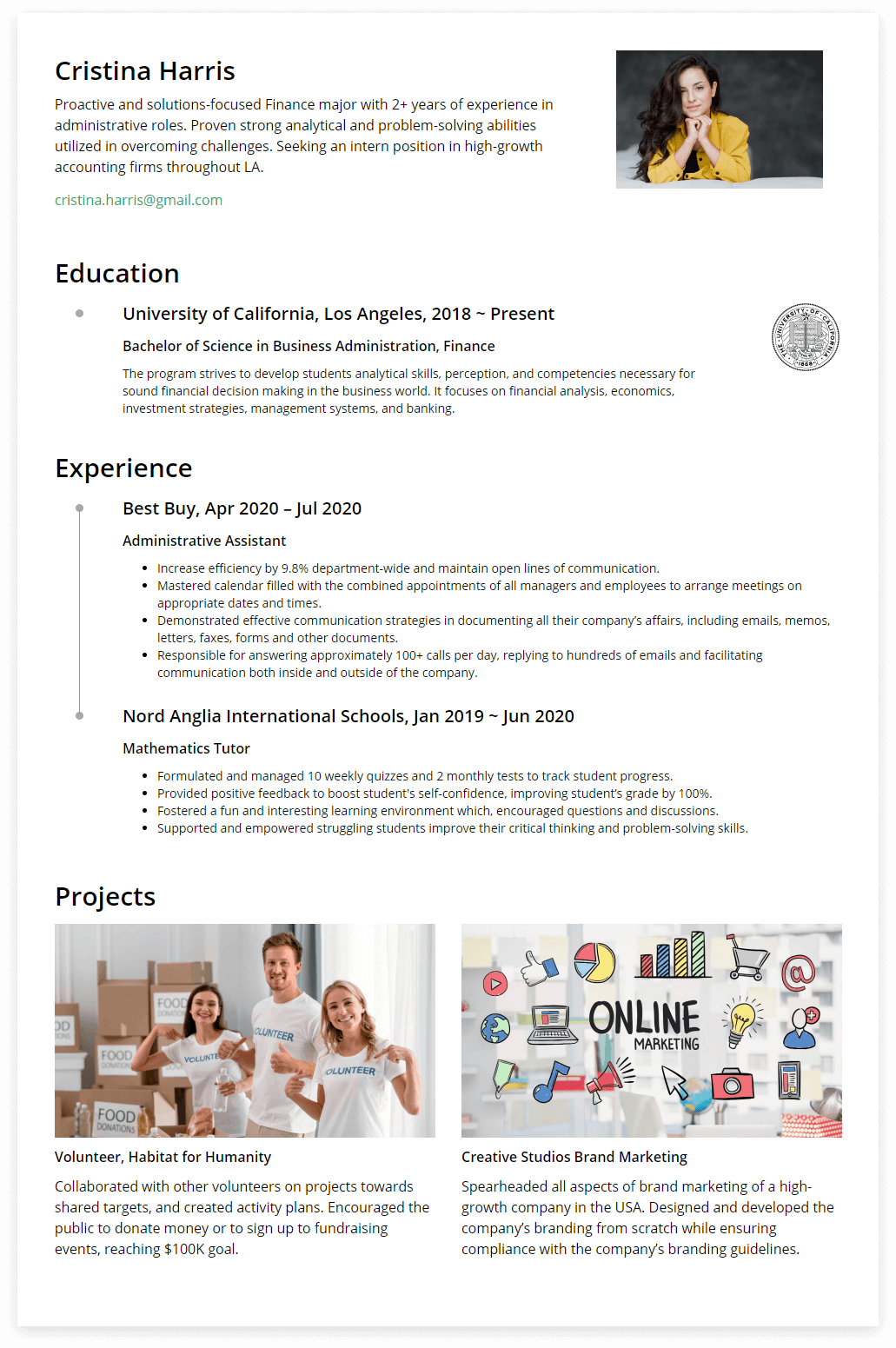How to write an internship resume? Pro Tips for Students
Outline:
Call out to freshers in the 21st century, landing one or two internships during summers has become a critical cornerstone for a bright future.
Here’s a moment for shattering your fantasy.
So, what’s the point of getting a summer internship while you can chill out at the beach and enjoy the splendid summer, you might ask.
Part 1
What is the purpose of an internship?
For starters, student internships help to explore your strengths, weaknesses, and preferences, and they’re precious opportunities to build some serious networking that might help you land on a desiring job after you graduate.
Also, internships allow you to test the water before you recklessly jump in the murky water of the unknown. Let’s say you have your heart set on working in a particular industry; an internship grants you an opportunity to see if it’s truly what you desire. You have to be in the industry first before jumping to the conclusion.
Moreover, I’d describe internships as semi-real world settings, meaning that you’re given a fraction amount of tolerance to make mistakes—a superb opportunity for you to ingrain all the dos and don’ts before you enter the job market.
More importantly, when it comes to landing your first job after you graduate, you’ll have a leg up with all the relevant experiences in the workforce.
Part 2
How to find an internship feels like a “destiny calling”?
Though internships might strike you with stereotypes such as low pays and repetitious errands, there are indeed some great internship jobs you can ponder upon.
Here are a few things to think carefully before crafting your resume:
- What kind of work do I want to try?
- What kind of work culture would suit me?
(e.g. Startups, SMEs, big corporate) - What are my strengths and personal interests?
The research can be pretty mundane, but answers to these questions can help you know what you want and fuel your ambition for a specific position. This, my friend, will help you cut through the clutter when you’re in an interview with an HR.
Where are the internship opportunities?
Remember to grasp the opportunities when they present themselves. Start with your contacts, and then you can move forward to tap into other channels such as job fairs and online websites.
- Your network: professors and classmates
- Job fairs
- Online websites
Part 3
How to write a resume for an internship?
Finally, with all the hard toil on self-searching and groundwork, it’s time to discuss internship resume examples. Note that college students are like white papers, so HRs won’t expect your resume packed with lots of experience, but they do expect you to show them soft and technical skills acquired in school. This is the ultimate internship resume template you’ll want to read carefully.

1. Contact Information
This part includes necessary information such as your name, email address, and telephone number. If you’re an art or engineer major, you can attach a personal website with your work portfolio and projects you’ve accomplished. Social media handles might also spark HR managers’ interest.
2. Resume Objectives
Resume objectives for internship resumes are critical for this small section can pique HR managers’ interests. You can use three to four lines to explain your strengths accumulated in the past, such as leading a school club or holding a summer camp for high school students, etc..
3. Education
Resume for college internship better starts with your education section since you have no prior working experience. After all, most of the relevant skills you have come from your education at this point. You can put your GPA here to let HR managers know how much effort you’ve put in school.
4. Experience
Here I’d recommend you using a reverse-chronological resume format. Starting from the most relevant date is more appealing to the manager.
What kinds of experiences are suitable enough to appeal to hiring managers?
When it comes to experience, you might want to keep in mind that the more isn’t necessary, the better, think of relevance before you jot down your experience as an ice cream scooper in your local community.
Every experience you enlist carries some purpose, whether it’s for the hiring manager to better understand your quality, traits or personality. For starters, you can list your achievements or projects you’ve accomplished. For some, accumulating voluntary work in non-profit organizations could be an option. This way, you might strike them as a caring or compassionate candidate.
Or, if you’ve assisted with school activities with other students, you can emphasize being a team leader or a team player is your strong suit. In a nutshell, participating in various activities isn’t solely for internships’ sake; it serves as opportunities to understand better what you like and dislike.
5. Skills
This section is for you to explain your experiences from the previous part better. Again, make it relevant! Look carefully at what kinds of people companies want to hire and emphasize on around three qualities; there could be more but keeping it crisp is more memorable.
Soft skills are highly recommended to write on the resume for an internship.
Soft skills are a combination of people skills, social skills, communication skills, social intelligence, and emotional intelligence quotients, among others. Complemented with hard skills enable you to navigate your way in a new environment.
Other options are languages and computer skills. If you yearn to be an UI/UX designer, then being savvy at Adobe software will make you more competitive. As for languages, in an interconnected world we’re in, there’s one thing for sure: the more languages you can speak, the more advantageous you are.
6. Additional Section
If your resume has filled an A4 page, this section might not be necessary. But for those who want to make internship resumes more vividly and show more characteristics, you can list down a few hobbies or interests. But remember the golden rule: Be relevant! Go with the work culture in the company. For example, if you’re applying for a position in a startup on the rise, you can emphasize that you’re creative or detail-oriented.
Finishing Touches for an Internship Resume/CV
Remember, there’s no need to be the first person to send out your application for an internship. Your ultimate goal is to outshine other candidates and nail the interview! But how to turn a 6-second glance into a 60-minute interview? Well, final touches are critical. After we’ve spent so much time on resume preparation, you don’t want your efforts going to the drain right?
To send out the college student resume for internship, three things to remember.
First, Check if you’ve received detailed instructions on submitting your student resume.
Companies usually have their own system to screen emails and resumes, you don’t want to miss out opportunities just because you use the wrong format or upload your resume to the wrong website!
Second, Proofread, proofread and proofread.
You want to present yourself as a reliable candidate, so misspelling or typo could be the reasons you’re rejected. Avoid these mistakes! You can ask your friends to go through it for you; they might offer some valuable insights!
Third, Tailor your resume.
Different companies have their own set of values and personalities, that’s why you need to do your research right before you write the resume. There’s no such thing as a one-size-fits-all resume. For different internship offers, you have to customize your resume to be more appealing to different companies.
Moral of the story
With all that being said, it’s obvious that to get your foot in the door is a torturous process. The self-exploring, researching, more researching, putting together a resume, reviewing, proofreading, and tailoring could take a few months. So start early and think wisely.
First step first, explore what you’re good at or interested in; second, do some serious research on companies you like; third, start to work on your resume and make sure all the important information is listed; finally, go through your resume over and over again. I know the process is mundane and difficult sometimes, but you reap what you sow. Good luck!
Further reading: College Students: Resume Examples, Formats & Tips
More Career and Recruitment Resources

Annie is currently a translation and interpretation graduate student who spends most of her time at home surrounded by books and freshly-made food. Whenever she yearns for nature, she’d hop on a bus or ride a bike to the nearest park where she would proceed to empty her mind and call it a day.






